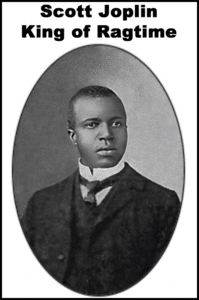Scott Joplin – “King of Ragtime.” | WPRN Staff
Scott Joplin often hailed as the “King of Ragtime,” made profound and lasting contributions to developing and popularizing ragtime music. His innovative compositions and distinctive approach to piano playing played a pivotal role in shaping the genre. Here are some critical aspects of Scott Joplin’s contributions to ragtime:
Joplin’s compositions were groundbreaking for their time, blending intricate syncopation with melodic richness. Classics like “The Maple Leaf Rag,” published in 1899, and “The Entertainer,” showcased his mastery of ragtime’s rhythmic complexities. These compositions became not only immensely popular during his era but also enduring standards that continue to be celebrated in the world of music.
Pioneering Style: Joplin’s piano-playing style was characterized by a graceful and nuanced touch, elevating the piano to a prominent position in ragtime music. His ability to infuse emotion and expression into his performances set him apart, and his compositions often featured intricate fingerwork and dynamic contrasts that showcased the piano’s capabilities.
Educational Contributions: Beyond his role as a performer and composer, Joplin envisioned ragtime as a serious and respected musical form. He sought to elevate ragtime from the entertainment realm to a level of artistic appreciation. In 1907, he published “School of Ragtime,” a set of six piano pieces to instruct aspiring musicians on ragtime composition and performance nuances.
Opera “Treemonisha”: Joplin’s ambitions extended beyond the confines of instrumental ragtime. His opera, “Treemonisha,” composed between 1907 and 1911, is a significant work that delves into serious themes such as education and African American culture. While the opera did not gain widespread recognition during Joplin’s lifetime, it is now considered a pioneering work in African American opera.
Advocacy for Recognition: Joplin advocated recognizing and respecting ragtime as a legitimate musical genre. He sought to distance it from the negative associations sometimes linked to popular entertainment of the time. Joplin envisioned ragtime as a form of classical music deserving severe consideration and appreciation.
Legacy and Impact: Scott Joplin’s contributions extended far beyond his lifetime. His compositions and contributions laid the foundation for accepting ragtime as an art form. While he faced challenges in gaining the recognition he sought during his lifetime, Joplin’s legacy as the “King of Ragtime” was solidified posthumously. In 1976, he was awarded a posthumous Pulitzer Prize for his contributions to American music.
Scott Joplin’s enduring impact on ragtime and American music is evident in the continued celebration of his works and the acknowledgment of ragtime as a vital part of the country’s musical heritage.
![]()
